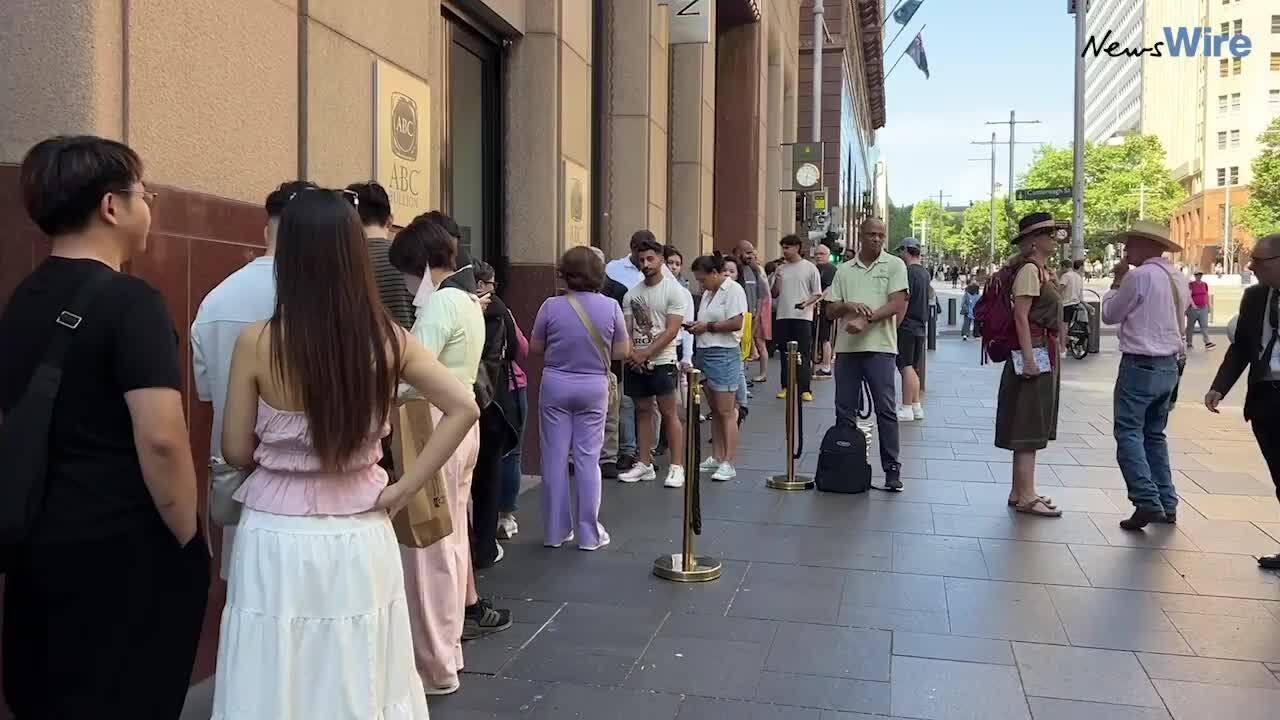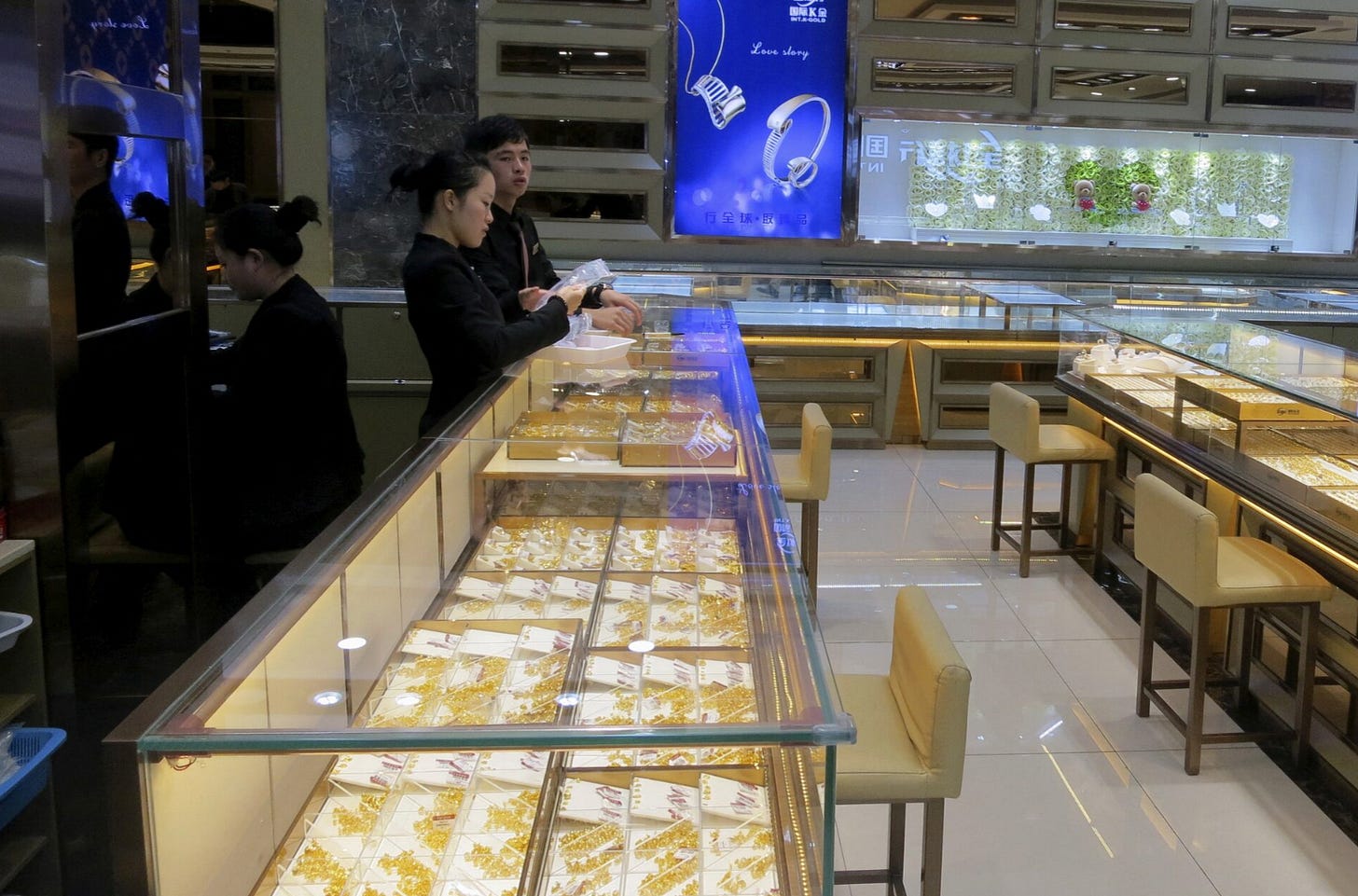One queue is not like the other
Queues beget clues. But please, don't mistake this story as a redux of Tuesday's. There's something far more important going on in the line-ups beyond Manhattan.
On Tuesday, we provided a peek at how record gold prices are playing out in New York City. As The New York Times reports, people have been lining up outside jewelry stores in midtown Manhattan to sell their bracelets, necklaces, and charms — cashing in otherwise unused trinkets to take advantage of the soaring spot gold price.
From the NYT front page story that ran last weekend:
Albert Chan stepped up to the counter. He unwrapped two chunky gold necklaces he had received as a wedding present. They had been in his closet for 20 years, and with gold so high, he decided to see what price he could get.
Queuing is the obvious, surface-level story. Reuters notes that customers are flocking to London’s Hatton Garden diamond district, forming long lines. On the continent in places like Austria and Germany, people are also lining up. And, according to The Guardian, more than 400 people were waiting outside a bullion dealer as far away as Sydney, Australia.
What seems like a similar story belies a striking contrast. While The New York Times focuses on Americans selling gold to pocket quick cash, Australians, Brits, and Europeans are buying gold— despite record high prices — as a hedge against what’s still to come.
From Reuters:
“There’s a mix of buying and selling gold, but buying is definitely stronger. Even though prices are high, people are still buying. Many believe prices will go even higher,” said Mashhood, a staff member at a local shop [in London].
That divergence says as much about culture as it does about economics.
In America, selling heirlooms is framed as a prudent move — taking profits when prices are high is what every smart person does. This fits with a broader American media narrative that has long discouraged the public from seeing gold as “money.” To most Americans, gold remains a speculative asset rather than a store of last resort, the kind of thing reserved for tinfoil-hatted doomsayers. Mainstream media’s message still remains: “take your profits, trust the system, and keep your faith in the Almighty Dollar.”
Meanwhile, foreign outlets like The Guardian and Reuters take a different view. Their coverage treats queues for gold more as a social barometer — a visible sign of growing distrust in governments and currencies. In Europe, that distrust stems from the fact that Germans, Austrians, and Brits still carry the imprint of 20th century hyperinflation, confiscation, and two World Wars. To them, gold isn’t a fringe concept; it’s insurance. And that insurance is becoming increasingly important.
Australia, with its large share of South and East Asian immigrants who have culturally always seen gold as a store of wealth, is also awakening to systemic fragility. Their reality includes a concentrated banking sector, a world-class property bubble, and the uneasy realization that being marooned at the confluence of the Indian and Pacific Oceans offers little protection from global turmoil.
China adds another dimension. There, the state is quietly hoarding gold. The People’s Bank of China has been adding to its reserves for months, even as retail buyers pull back, squeezed by prices and guided by cautious official messaging. Chinese media describe a “see-saw” sentiment — not panic, not exuberance — just a collective awareness that real value is being consolidated at the top.
From the South China Morning Post:
Chinese investors and consumers are finding themselves caught up in a whirlwind of excitement and trepidation – frustrated by missed opportunities, wary of the record-high rally, and scrambling to decide whether to buy, sell, or hold their glittering assets.
Overall, what these queues are telling us is about more than just gold. It’s about who still trusts the story they’re being sold. Somehow, most Americans still willingly believe the system can be managed and haven’t accepted the idea that the global order is cracking. Most Europeans and Australians no longer believe that.
And in China, well, you just let the system do the believing for you.




The value of any commodity as a store of wealth depends completely on its perceived value. Will some impending collapse find it maintaining that value? It depends completely on the public's perception.
The conversion from some speculative investment into an exchange currency depends on someone deciding that it has comparable value to something else in trade.
Not that investing in gold is a bad thing. If you had done it in the past, you would have made out quite well.
Buying in now when it is trading at an all time high in hopes that it will stay there or continue to increase in value probably isn't the wisest choice. But the people trading in gold don't really care. They make money either direction that the prices swing.
I’ve read that what mattered in the months following the collapse of Yugoslavia was friends & family. In contrast, well provisioned individuals didn’t survive; guns & food didn’t make the difference between life & death. Social networks made the difference.
In the US in 2010 (?) I spoke with a Russian GenX survivor of the collapse of the USSR. She said it was her grandmother‘s milk cow that made all the difference.
Personally, at my wealth & income levels, and at my age & family situation, if I had cash to spare I wouldn’t purchase gold but hard assets: housing, arable land, food - and in the US I’d purchase guns.
Food, friends & family, firearms: “4 F’s.”